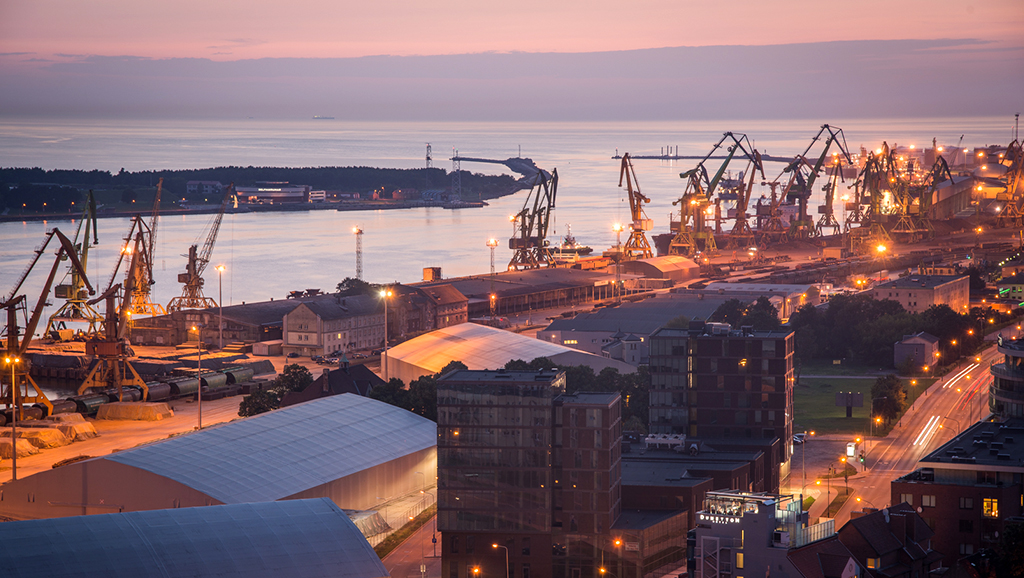
10 Jun The only competitive and state-of-the-art seaport in Lithuania
Introducing the Port of Klaipėda, the fastest growing port in the eastern Baltic Sea region, with average annual growth of 6.6 percent.
In order to improve the Port of Klaipėda’s parameters and quality of services for customers, a continuous flow of investments is made in the port. In 2020-2023, a planned €352.4 million will be invested in the development of Klaipėda’s port, part of which will be covered by European Union (EU) structural funds. Due to its favorable geographical position, the Port of Klaipėda operates as an efficient logistics center, which is especially important for countries in the Commonwealth of Independent States. Smooth interoperability and cooperation is enabled by utilizing the same type of railway track gauge, ensuring communication with Far Eastern markets as well.
The liquefied natural gas (LNG) terminal that operates in the Port of Klaipėda is one of the most important national facilities for safeguarding energy security. It has created the necessary conditions for the emergence of a natural gas market in Lithuania and allows the port to act as an LNG distribution center. From 2020, LNG-powered vessels calling at the Port of Klaipėda can be bunkered according to all three schemes: at different port terminals from LNG tanker to ship, from terminal to ship at a dedicated LNG distribution station and from ship to ship.
In addition and since 2018, global container line MSC has chosen one of the terminals at the Port of Klaipėda as a container distribution center in the Baltic Sea. IT systems at the Port of Klaipėda are constantly being updated—currently, about 30 modern IT programs have been installed in the Klaipeda State Seaport Authority alone, which help the port’s authority, users, cargo carriers and controlling institutions to work smoothly and dynamically. In 2020, the port became one of the few European ports into which pilots can navigate ships remotely, thus saving time and ensuring smooth shipping processes, even in poor weather conditions.
Added value is created for the port through the adjacent Klaipėda Free Economic Zone (FEZ)—the largest and the most experienced FEZ in Lithuania that is playing an important role in the successful industrial development of the city. Klaipėda FEZ started its activities as a traditional industrial zone, where the leading companies in plastic, metal processing, electronic components and other sectors established themselves. However, recently Klaipėda FEZ has become an important place for businesses engaged in research and development, and startups.
The Port of Klaipėda is an innovative and modern port. Many innovations have been introduced here to make it the only competitive and state-of-the-art port in Lithuania.
Unique training center and innovative navigation trainers
The port company Klaipėdos Smeltė, which handles containers, operates a special simulator for the initial training of crane operators in an artificially created environment that corresponds exactly with the real world. Supervised by experts from the training leader Maersk Training Center, instructors are selected from the company’s employees. Those instructors are currently training Klaipėdos Smeltė crane operators to work with ship-to-shore (STS) and rubber-tyred gantry (RTG) container cranes. STS operator training takes 15 days and RTG operator training takes seven days. About 30 percent of candidates pass this training and, since 2013, 26 STS operators and 37 RTG operators have qualified. The €290,000 training simulator was made by the Applied Research Institute in India and is certified with the EU’s mandatory CE marking.
In addition, the Port of Klaipėda cooperated with the Lithuanian Maritime Academy to establish another unique simulator. This simulator with visualization is a multifunctional navigation, radar, electronic cartography, ship control and radio communication simulator designed to train students and professional seafarers in recreating and analyzing the most complex navigational situations. Furthermore, its enables visualization of the navigation area in the Port of Klaipėda.
The multifunctional simulator is not only designed for training students and improving the qualifications of pilots, but it is also widely used for research and commissioned work. According to the current parameters of the Port of Klaipėda’s entrance channel, tests are performed into the implications to operations of entering or leaving vessels of various parameters and types under different hydrometeorological conditions. Simultaneously, 44 users can perform exercises in the port’s training complex, following different programs under the guidance of six instructors.
Robot locomotive saves energy
Since 2016, the stevedoring company Bega has replaced traditional locomotives with electrical equipment that is both economically and ecologically superior. Their robots are programmed not only to move train wagons, but also to divide and sort them into different railway branches. A total of four electric robotic locomotives are currently operating in the port, which were developed and manufactured by Bega specialists using conversions from old diesel locomotives. A modernization program envisages that the company will run a total of eight such robots in the future.
Shipyard service
The Port of Klaipėda provides services in the shipping construction and repair sector that have no equivalents in Europe. These include the largest gas-powered ferry Boknafjord, the first green ferry to the Åland Islands and the cutting-edge Saarema ice-class environmentally friendly ferries. These projects were implemented by a modern West Baltic shipyard located in the Port of Klaipėda that offers a full range of services from design to turnkey shipbuilding.
The company belongs to the Vakarų laivų gamykla group of companies, which is a part of the largest Estonian concern, BLRT Grupp. Currently, the main activity goal of the Western Baltic Shipyard is the turnkey construction of various types of ships. The company specializes in the construction of tugs, ferries, fishing and supply vessels. In addition, the shipyard is also the first shipbuilding company in the Baltic states to build and install the necessary equipment for renewable energy sources in the form of offshore wind farms.

